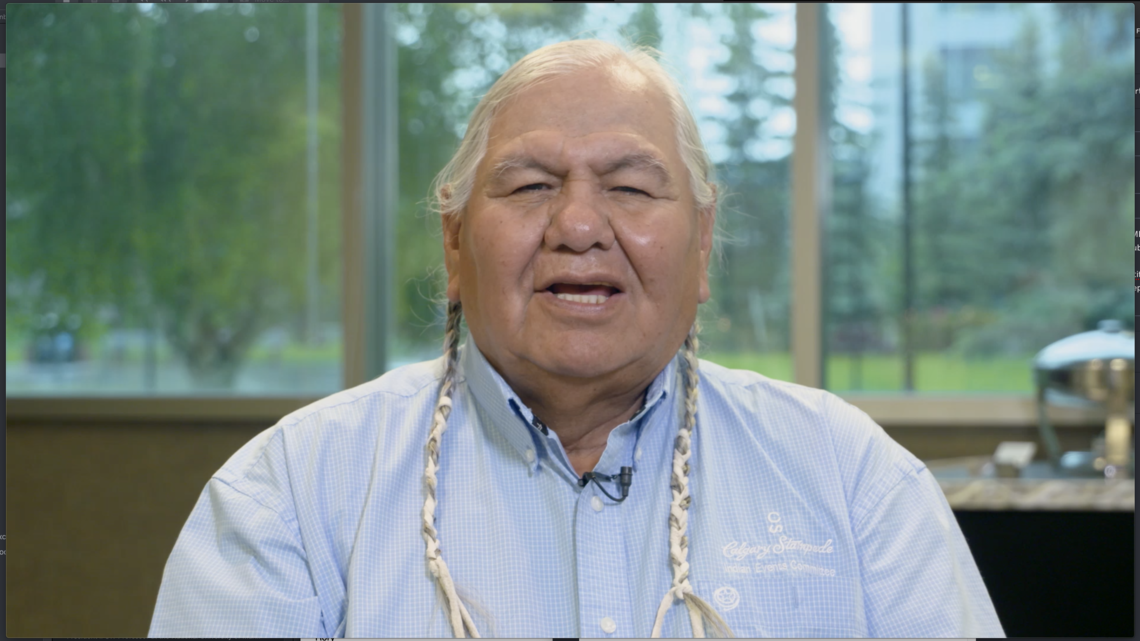Sept. 30, 2020
“Ghost Stories in Our Life.” Dr. Reg Crowshoe says social workers need to begin with creating ethical spaces to work with Indigenous peoples.

"Those traumas that we feel – in our culture we say they come from the original emotion that created them,” Reg Crowshoe pauses for a moment, then touches his heart. “We call them ghosts. They're ghost stories in our life.”
On Orange shirt day – a day created to acknowledge those who died, those who survived and the terrible legacy of Canada’s residential school system – Reg Crowshoe and his wife Rose took a moment to share some of his personal ghost story of his difficult journey as a survivor of a residential school.
“When I was young … There was nine of us in the dorm who were nine years old,” says Crowshoe, his voice thick with emotion. “Today I think I'm the only one left. You want to visit your friends, but they're not there because of what they went through in residential school. I think the toughest part was the death that we'd see. When some of those kids disappeared ... you’d find bones. Of course, when you’d bring them back to the priest, you’d get punished. But those were human bones. So that was a tough part of residential school.”

Dr. Reg Crowshoe is a renowned elder and former chief of the Piikuni Nation. He is also the founder of the Old Man River Cultural Society, and author of Akak’stiman, A Blackfoot Framework for Decision-Making and Mediation Processes.
Not surprisingly, Crowshoe – or Awakaaseena, which means Deer Chief in the Blackfoot language – calls himself a survivor, but says he still lives with the trauma every day. “My father used to say, ‘You may be done with the past but is the past done with you?’"
When Crowshoe, who is a Blackfoot elder and former chief of the Piikuni, reflects on his Residential School experience he also reflects on how Indigenous culture and ceremony helped him to heal, and better cope with his past. He is now able to focus on helping the next generation by passing on his wisdom to his own community as well as working to help bridge the gap toward reconciliation with settler communities.
In that work he speaks of creating an ethical space. A place where the oral tradition of his people can safely work with what he calls the “written, default system” that he was first introduced to in residential school.
“I'm happy for Reconciliation because now we can explore that unhealthiest place that we're at now,” he explains. “We're two systems that don't understand each other. It’s like Mac and IBM computers – they always talk about compatibility. That's Reconciliation. How are we compatible? When we look at a strategy for reconciliation – I see it as an ethical space.
People ask, ‘What is ethical space?’ Well in the default system you can show a board room and say, ‘Here's the code of conduct, and here's boardroom procedures. Now it's a safe place. You can talk when you want to talk, because you're safe to talk.’ Well, that's an ethical space. In our culture there are traditional conventions. You make a smudge and you tell the stories of code of conduct and stories of procedure. Then it's a safe place to talk in our oral system.”
Dr. Reg Crowshoe is a renowned elder and former chief of the Piikuni Nation in Alberta, Canada. Dr. Crowshoe is widely recognized for his dedication to Piikuni artifacts, traditions, language, culture, and history, and, like his father the late Dr. Joseph Crowshoe, was awarded an honorary Doctorate Degree by the University of Calgary in 2001. Dr. Crowshoe is also the founder of the Old Man River Cultural Society, and author of Akak’stiman, A Blackfoot Framework for Decision-Making and Mediation Processes, published by University of Calgary Press in 2002.
